常见不及物动词及搭配精编版
- 格式:docx
- 大小:16.73 KB
- 文档页数:11
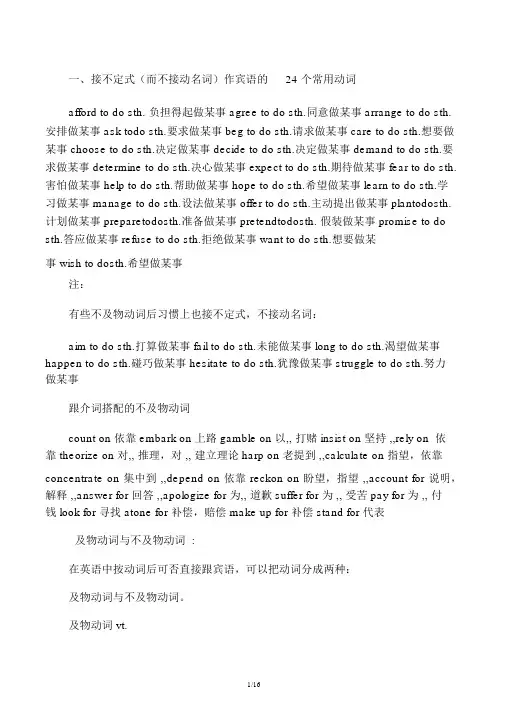
一、接不定式(而不接动名词)作宾语的24 个常用动词afford to do sth. 负担得起做某事 agree to do sth.同意做某事 arrange to do sth. 安排做某事 ask todo sth.要求做某事 beg to do sth.请求做某事 care to do sth.想要做某事 choose to do sth.决定做某事 decide to do sth.决定做某事 demand to do sth.要求做某事 determine to do sth.决心做某事 expect to do sth.期待做某事 fear to do sth.害怕做某事 help to do sth.帮助做某事 hope to do sth.希望做某事 learn to do sth.学习做某事 manage to do sth.设法做某事 offer to do sth.主动提出做某事plantodosth.计划做某事 preparetodosth.准备做某事 pretendtodosth. 假装做某事 promise to do sth.答应做某事 refuse to do sth.拒绝做某事 want to do sth.想要做某事 wish to dosth.希望做某事注:有些不及物动词后习惯上也接不定式,不接动名词:aim to do sth.打算做某事 fail to do sth.未能做某事 long to do sth.渴望做某事happen to do sth.碰巧做某事 hesitate to do sth.犹豫做某事 struggle to do sth.努力做某事跟介词搭配的不及物动词count on 依靠 embark on 上路 gamble on 以,, 打赌 insist on 坚持 ,,rely on 依靠 theorize on 对,, 推理,对 ,, 建立理论 harp on 老提到 ,,calculate on 指望,依靠concentrate on 集中到 ,,depend on 依靠 reckon on 盼望,指望 ,,account for 说明,解释 ,,answer for 回答 ,,apologize for 为,, 道歉 suffer for 为 ,, 受苦 pay for 为 ,, 付钱 look for 寻找 atone for 补偿,赔偿 make up for 补偿 stand for 代表及物动词与不及物动词 :在英语中按动词后可否直接跟宾语,可以把动词分成两种:及物动词与不及物动词。
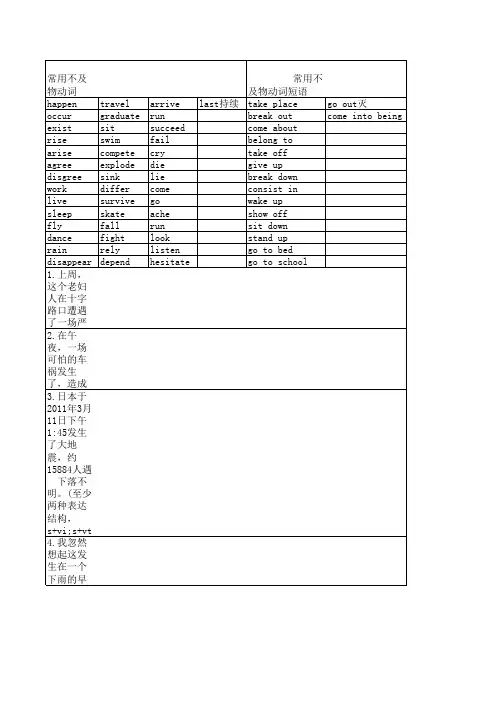
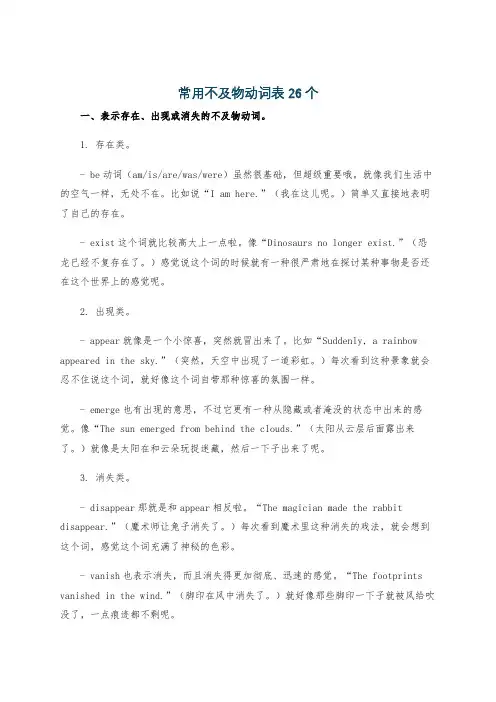
常用不及物动词表26个一、表示存在、出现或消失的不及物动词。
1. 存在类。
- be动词(am/is/are/was/were)虽然很基础,但超级重要哦。
就像我们生活中的空气一样,无处不在。
比如说“I am here.”(我在这儿呢。
)简单又直接地表明了自己的存在。
- exist这个词就比较高大上一点啦。
像“Dinosaurs no longer exist.”(恐龙已经不复存在了。
)感觉说这个词的时候就有一种很严肃地在探讨某种事物是否还在这个世界上的感觉呢。
2. 出现类。
- appear就像是一个小惊喜,突然就冒出来了。
比如“Suddenly, a rainbow appeared in the sky.”(突然,天空中出现了一道彩虹。
)每次看到这种景象就会忍不住说这个词,就好像这个词自带那种惊喜的氛围一样。
- emerge也有出现的意思,不过它更有一种从隐藏或者淹没的状态中出来的感觉。
像“The sun emerged from behind the clouds.”(太阳从云层后面露出来了。
)就像是太阳在和云朵玩捉迷藏,然后一下子出来了呢。
3. 消失类。
- disappear那就是和appear相反啦。
“The magician made the rabbit disappear.”(魔术师让兔子消失了。
)每次看到魔术里这种消失的戏法,就会想到这个词,感觉这个词充满了神秘的色彩。
- vanish也表示消失,而且消失得更加彻底、迅速的感觉。
“The footprints vanished in the wind.”(脚印在风中消失了。
)就好像那些脚印一下子就被风给吹没了,一点痕迹都不剩呢。
二、表示运动的不及物动词。
1. 走类。
- walk是我们最常用的啦,平平淡淡才是真嘛。
“I walk to school every day.”(我每天走路去上学。
)就像我们日常的步伐一样,稳定又踏实。
- stroll就比较悠闲自在啦。
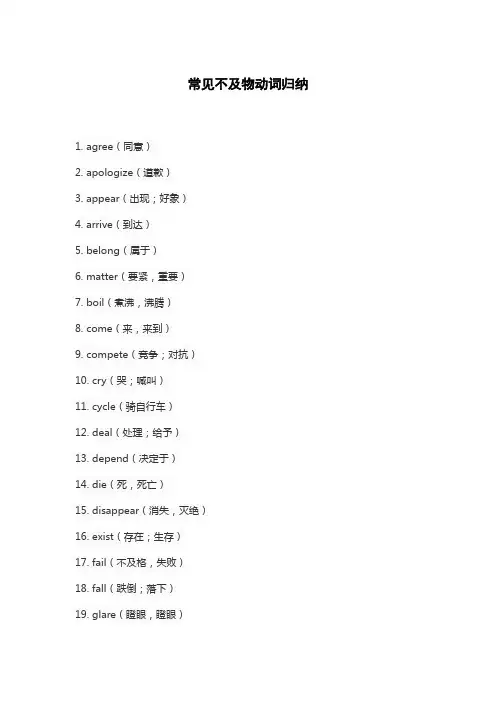
常见不及物动词归纳1. agree(同意)2. apologize(道歉)3. appear(出现;好象)4. arrive(到达)5. belong(属于)6. matter(要紧,重要)7. boil(煮沸,沸腾)8. come(来,来到)9. compete(竞争;对抗)10. cry(哭;喊叫)11. cycle(骑自行车)12. deal(处理;给予)13. depend(决定于)14. die(死,死亡)15. disappear(消失,灭绝)16. exist(存在;生存)17. fail(不及格,失败)18. fall(跌倒;落下)19. glare(瞪眼,瞪眼)20. go(去,走)21. graduate(毕业)22. happen(发生,出现)23. hesitate(踌躇,犹豫)24. hurry(匆忙)25. laugh(笑,大笑)26. lie(躺,平躺)27. listen(注意地听)28. live(居住,生活)29. look(看)30. move(搬家;移动)31. object(反对)32. occur(发生)33. rain(下雨)34. rest(休息;其余的)35. rise(上升,起床)36. run(跑)37. sail(航行,起航)38. settle(定居)39. sit(坐)40. skate(溜冰,滑冰)41. sleep(睡觉)42. smile(微笑)43. snow(下雪)44. stand(站立,位于)45. stare(凝视,盯着看)46. stay(呆,停留)47. succeed(成功)48. swim(游泳)49. talk(谈话)50. travel(旅行)51. wait(等,等待)52. walk(步行,散步)。
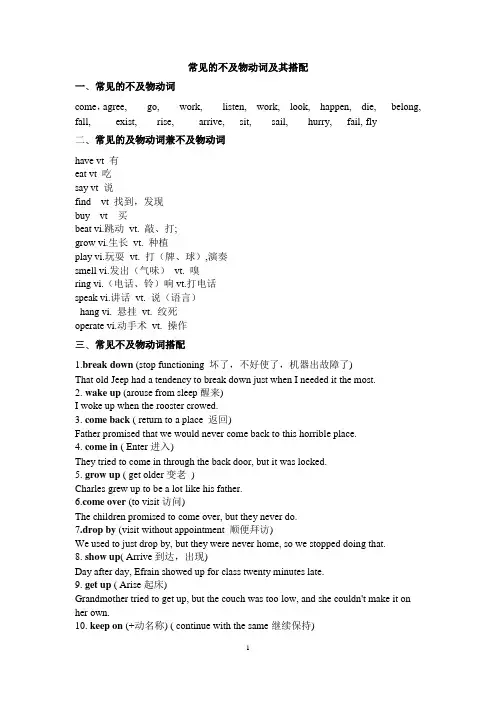
常见的不及物动词及其搭配一、常见的不及物动词come,agree, go, work, listen, work, look, happen, die, belong, fall, exist, rise, arrive, sit, sail, hurry, fail, fly二、常见的及物动词兼不及物动词have vt 有eat vt 吃say vt 说find vt 找到,发现buy vt 买beat vi.跳动vt. 敲、打;grow vi.生长vt. 种植play vi.玩耍vt. 打(牌、球),演奏smell vi.发出(气味)vt. 嗅ring vi.(电话、铃)响vt.打电话speak vi.讲话vt. 说(语言)hang vi. 悬挂vt. 绞死operate vi.动手术vt. 操作三、常见不及物动词搭配1.break down (stop functioning 坏了,不好使了,机器出故障了)That old Jeep had a tendency to break down just when I needed it the most.2. wake up (arouse from sleep醒来)I woke up when the rooster crowed.3. come back ( return to a place 返回)Father promised that we would never come back to this horrible place.4. come in ( Enter进入)They tried to come in through the back door, but it was locked.5. grow up ( get older变老)Charles grew up to be a lot like his father.e over (to visit访问)The children promised to come over, but they never do.7.drop by (visit without appointment 顺便拜访)We used to just drop by, but they were never home, so we stopped doing that.8. show up( Arrive到达,出现)Day after day, Efrain showed up for class twenty minutes late.9. get up ( Arise起床)Grandmother tried to get up, but the couch was too low, and she couldn't make it on her own.10. keep on (+动名称) ( continue with the same继续保持)He tried to keep on singing long after his voice was ruined.11. come to ( regain consciousness恢复意识)He was hit on the head very hard, but after several minutes, he started to come to again.12.go on ( Continue继续)He would finish one Dickens novel and then just go on to the next.13. go on (2) ( Happen发生)The cops heard all the noise and stopped to see what was going on.14. keep away from ( remain at a distance保持距离)The judge warned the stalker to keep away from his victim's home.四、跟介词搭配的不及物动词count on 依靠insist on坚持……rely on依靠calculate on 指望,依靠concentrate on 集中到……depend on依靠account for 说明,解释……apologize for为……道歉suffer for为……受苦pay for 为……付钱look for 寻找make up for补偿stand for代表compensate for 补偿refrain from抑制,忍住suffer from 受苦,患病benefit from 获益于escape from 从……逃开approve of 同意consist of 由……组成deal/cope with 处理reckon on盼望,指望……despair of 失望dream of 梦想做某事believe in 相信……persevere in 坚持……succeed in 在某方面成功delight in 为……高兴join in 加入……participate in 参加……persist in 坚持……specialize in 专门从事某事,在某方面专长aim at 瞄准于……laugh at 嘲笑smile at向……微笑work at 从事于……,用功于……look at 看着……object to 反对……react to 对某事作出反应respond to 对某事作出回应refer to 提到……turn to 转向……。
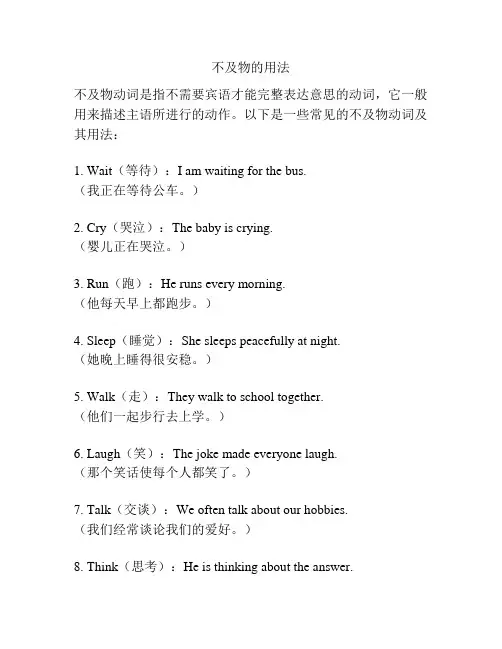
不及物的用法
不及物动词是指不需要宾语才能完整表达意思的动词,它一般用来描述主语所进行的动作。
以下是一些常见的不及物动词及其用法:
1. Wait(等待):I am waiting for the bus.
(我正在等待公车。
)
2. Cry(哭泣):The baby is crying.
(婴儿正在哭泣。
)
3. Run(跑):He runs every morning.
(他每天早上都跑步。
)
4. Sleep(睡觉):She sleeps peacefully at night.
(她晚上睡得很安稳。
)
5. Walk(走):They walk to school together.
(他们一起步行去上学。
)
6. Laugh(笑):The joke made everyone laugh.
(那个笑话使每个人都笑了。
)
7. Talk(交谈):We often talk about our hobbies.
(我们经常谈论我们的爱好。
)
8. Think(思考):He is thinking about the answer.
(他正在考虑答案。
)
9. Sing(唱歌):She sings beautifully.
(她唱得很美。
)
10. Dance(跳舞):They dance gracefully on the stage. (他们在舞台上跳舞优美。
)。
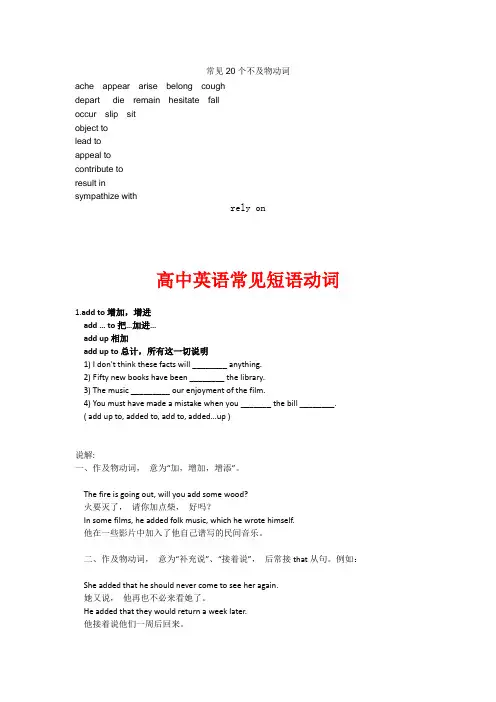
常见20个不及物动词ache appear arise belong coughdepart die remain hesitate falloccur slip sitobject tolead toappeal tocontribute toresult insympathize withrely on高中英语常见短语动词1.add to增加,增进add … to把…加进…add up相加add up to总计,所有这一切说明1) I don't think these facts will ________ anything.2) Fifty new books have been ________ the library.3) The music _________ our enjoyment of the film.4) You must have made a mistake when you _______ the bill ________.( add up to, added to, add to, added…up )说解:一、作及物动词,意为“加,增加,增添”。
The fire is going out, will you add some wood?火要灭了,请你加点柴,好吗?In some films, he added folk music, which he wrote himself.他在一些影片中加入了他自己谱写的民间音乐。
二、作及物动词,意为“补充说”、“接着说”,后常接that从句。
例如:She added that he should never come to see her again.她又说,他再也不必来看她了。
He added that they would return a week later.他接着说他们一周后回来。
“At your age you should give all your attention to your studies,” her father added.她的父亲又说:“像你这样的年纪应当把精力放在学习上。
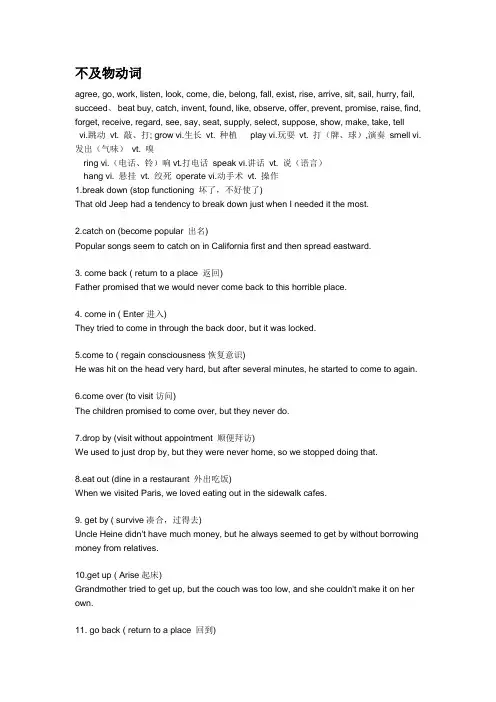
不及物动词agree, go, work, listen, look, come, die, belong, fall, exist, rise, arrive, sit, sail, hurry, fail, succeed、beat buy, catch, invent, found, like, observe, offer, prevent, promise, raise, find, forget, receive, regard, see, say, seat, supply, select, suppose, show, make, take, tell vi.跳动vt. 敲、打; grow vi.生长vt. 种植play vi.玩耍vt. 打(牌、球),演奏smell vi.发出(气味)vt. 嗅ring vi.(电话、铃)响vt.打电话speak vi.讲话vt. 说(语言)hang vi. 悬挂vt. 绞死operate vi.动手术vt. 操作1.break down (stop functioning 坏了,不好使了)That old Jeep had a tendency to break down just when I needed it the most.2.catch on (become popular 出名)Popular songs seem to catch on in California first and then spread eastward.3. come back ( return to a place 返回)Father promised that we would never come back to this horrible place.4. come in ( Enter进入)They tried to come in through the back door, but it was locked.e to ( regain consciousness恢复意识)He was hit on the head very hard, but after several minutes, he started to come to again.e over (to visit访问)The children promised to come over, but they never do.7.drop by (visit without appointment 顺便拜访)We used to just drop by, but they were never home, so we stopped doing that.8.eat out (dine in a restaurant 外出吃饭)When we visited Paris, we loved eating out in the sidewalk cafes.9. get by ( survive凑合,过得去)Uncle Heine didn't have much money, but he always seemed to get by without borrowing money from relatives.10.get up ( Arise起床)Grandmother tried to get up, but the couch was too low, and she couldn't make it on her own.11. go back ( return to a place 回到)It's hard to imagine that we will ever go back to Lithuania.12.go on ( Continue继续)He would finish one Dickens novel and then just go on to the next.13. go on (2) ( Happen发生)The cops heard all the noise and stopped to see what was going on.14. grow up ( get older变老)Charles grew up to be a lot like his father.15.keep away ( remain at a distance保持距离)The judge warned the stalker to keep away from his victim's home.16. keep on (+动名称) ( continue with the same继续保持)He tried to keep on singing long after his voice was ruined.17. pass out ( lose consciousness, faint昏过去,晕)He had drunk too much; he passed out on the sidewalk outside the bar.18. show off ( demonstrate haughtily 炫耀)Whenever he sat down at the piano, we knew he was going to show off.19. show up( Arrive到达,出现)Day after day, Efrain showed up for class twenty minutes late.20. wake up (arouse from sleep醒来)I woke up when the rooster crowed.。
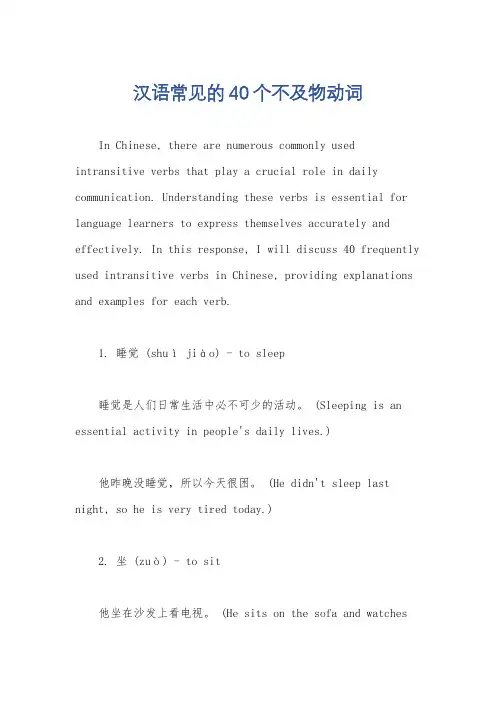
汉语常见的40个不及物动词In Chinese, there are numerous commonly usedintransitive verbs that play a crucial role in daily communication. Understanding these verbs is essential for language learners to express themselves accurately and effectively. In this response, I will discuss 40 frequently used intransitive verbs in Chinese, providing explanations and examples for each verb.1. 睡觉(shuì jiào) - to sleep睡觉是人们日常生活中必不可少的活动。
(Sleeping is an essential activity in people's daily lives.)他昨晚没睡觉,所以今天很困。
(He didn't sleep last night, so he is very tired today.)2. 坐(zuò) - to sit他坐在沙发上看电视。
(He sits on the sofa and watchesTV.)请坐,别客气。
(Please have a seat, don't be polite.)3. 站(zhàn) - to stand他站在门口等着朋友。
(He stands at the door waiting for his friend.)请站起来,让我坐一下。
(Please stand up and let me sit for a moment.)4. 跑(pǎo) - to run他每天早上去公园跑步锻炼身体。
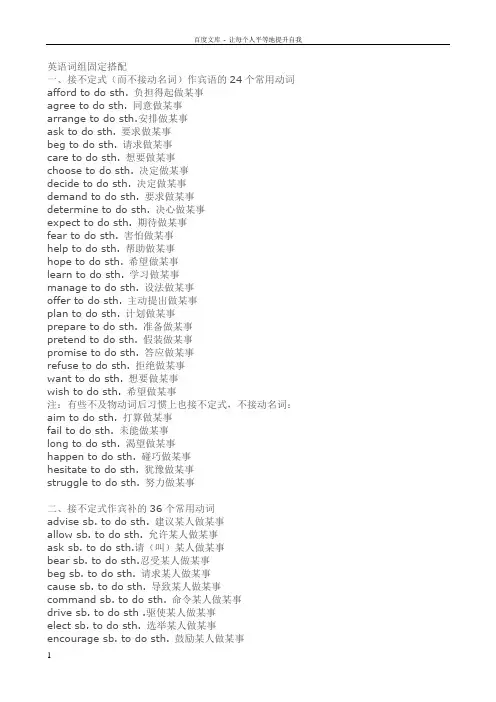
英语词组固定搭配一、接不定式(而不接动名词)作宾语的24个常用动词afford to do sth. 负担得起做某事agree to do sth. 同意做某事arrange to do sth.安排做某事ask to do sth. 要求做某事beg to do sth. 请求做某事care to do sth. 想要做某事choose to do sth. 决定做某事decide to do sth. 决定做某事demand to do sth. 要求做某事determine to do sth. 决心做某事expect to do sth. 期待做某事fear to do sth. 害怕做某事help to do sth. 帮助做某事hope to do sth. 希望做某事learn to do sth. 学习做某事manage to do sth. 设法做某事offer to do sth. 主动提出做某事plan to do sth. 计划做某事prepare to do sth. 准备做某事pretend to do sth. 假装做某事promise to do sth. 答应做某事refuse to do sth. 拒绝做某事want to do sth. 想要做某事wish to do sth. 希望做某事注:有些不及物动词后习惯上也接不定式,不接动名词:aim to do sth. 打算做某事fail to do sth. 未能做某事long to do sth. 渴望做某事happen to do sth. 碰巧做某事hesitate to do sth. 犹豫做某事struggle to do sth. 努力做某事二、接不定式作宾补的36个常用动词advise sb. to do sth. 建议某人做某事allow sb. to do sth. 允许某人做某事ask sb. to do sth.请(叫)某人做某事bear sb. to do sth.忍受某人做某事beg sb. to do sth. 请求某人做某事cause sb. to do sth. 导致某人做某事command sb. to do sth. 命令某人做某事drive sb. to do sth .驱使某人做某事elect sb. to do sth. 选举某人做某事encourage sb. to do sth. 鼓励某人做某事expect sb. to do sth. 期望某人做某事forbid sb. to do sth. 禁止某人做某事force sb. to do sth. 强迫某人做某事get sb. to do sth. 使(要)某人做某事hate sb. to do sth. 讨厌某人做某事help sb. to do sth. 帮助某人做某事intend sb. to do sth. 打算要某人做某事invite sb. to do sth. 邀请某人做某事leave sb. to do sth. 留下某人做某事like sb. to do sth. 喜欢某人做某事mean sb. to do sth. 打算要某人做某事need sb. to do sth. 需要某人做某事oblige sb. to do sth. 迫使某人做某事order sb. to do sth. 命令某人做某事permit sb. to do sth. 允许某人做某事persuade sb. to do sth. 说服某人做某事prefer sb. to do sth. 宁愿某人做某事request sb. to do sth. 要求某人做某事remind sb. to do sth. 提醒某人做某事teach sb. to do sth .教某人做某事tell sb. to do sth. 告诉某人做某事train sb. to do sth. 训练某人做某事trouble sb. to do sth. 麻烦某人做某事want sb. to do sth. 想要某人做某事warn sb. to do sth. 警告某人做某事wish sb. to do sth. 希望某人做某事注:不要受汉语意思的影响而误用以下动词句型:要表示以上意思,可换用其他表达:汉语的“原谅某人做某事”,英语可说成excuse [forgive] sb. for doing sth.。
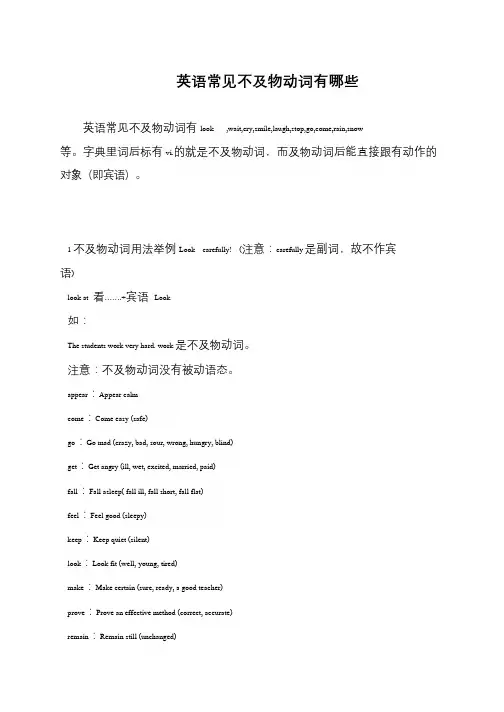
英语常见不及物动词有哪些
英语常见不及物动词有look ,wait,cry,smile,laugh,stop,go,come,rain,snow
等。
字典里词后标有vi.的就是不及物动词,而及物动词后能直接跟有动作的对象(即宾语)。
1 不及物动词用法举例Look carefully! (注意:carefully 是副词,故不作宾
语)
look at 看…….+宾语Look
如:
The students work very hard. work 是不及物动词。
注意:不及物动词没有被动语态。
appear:Appear calm
come:Come easy (safe)
go:Go mad (crazy, bad, sour, wrong, hungry, blind)
get:Get angry (ill, wet, excited, married, paid)
fall:Fall asleep( fall ill, fall short, fall flat)
feel:Feel good (sleepy)
keep:Keep quiet (silent)
look:Look fit (well, young, tired)
make:Make certain (sure, ready, a good teacher)
prove:Prove an effective method (correct, accurate)
remain:Remain still (unchanged)。
不及物动词用法
不及物动词是指没有宾语或宾语是名词的动词。
不及物动词只能单独使用,不能直接接一个名词作为宾语。
以下是一些常见的不及物动词用例:
1. 睡觉(sleep):我晚上睡得很好。
2. 喝水(drink):他早上起床后喝了一杯水。
3. 跑步(run):他每天早晨都去公园跑步。
4. 唱歌(sing):孩子们在聚会上唱歌跳舞。
5. 游泳(swim):她喜欢在海里游泳。
6. 笑(laugh):我们听到一个有趣的笑话,大家都笑了起来。
7. 想念(miss):我很想念我的家人。
8. 离开(leave):下班后,他离开了办公室。
9. 哭(cry):当她听到噩耗时,她哭了起来。
10. 跳舞(dance):他们在派对上跳舞欢庆。
需要注意的是,有些动词既可以作及物动词,也可以作不及物动词,具体用法要根据上下文来确定。
初中常见不及物动词1.只是不及物的:faint,hesitate,lie,occur,pause,rain,remain,sleep,sneeze.2.常见的及物,不及物的:answer,ask,begin,borrow,choose,climb,dance,eat,enter,fail,fill,grow,help, hurry,jump,know,leave,marry,meet,obey,pull,read,see,sell,touch,wash,w atch,win,write3.及物不及物意义变化的lift.升高beat vi.跳动 vt. 敲、打; grow vi.生长 vt. 种植 play vi.玩耍 vt. 打(牌、球),演奏 smell vi.发出(气味) vt. 嗅 ring vi.(电话、铃)响vt.打电话 speak vi.讲话 vt. 说(语言) hang vi. 悬挂 vt. 绞死 operate vi.动手术 vt. 操作4.意义不变的start, answer, sing, close, consider, insist, read, learn, prepare, pay, hurt, improve....5.常做不及物动词:live, go, work, listen, look, come, die, belong, fall, exist, rise, arrive, sit, sa il, hurry, fail, succeed. agree...不及物动词agree, go, work, listen, look, come, die, belong, fall, exist, rise, arrive, sit, sail, hurry, fail, succeed、 beat、 buy, catch, invent, found, like, observe, offer, prevent, promise, raise, find, forget,receive, regard, see, say, seat, supply, select, suppose, show, make, take, tell6.不及物动词短语1.break down (stop functioning 坏了,不好使了)That old Jeep had a tendency to break down just when I needed it the most.2.catch on (become popular 出名)Popular songs seem to catch on in California first and then spreadeastward.3. come back ( return to a place 返回)Father promised that we would never come back to this horrible place.4. come in ( Enter进入)They tried to come in through the back door, but it was locked.e to ( regain consciousness恢复意识)He was hit on the head very hard, but after several minutes, he started to come to again.e over (to visit访问)The children promised to come over, but they never do.7.drop by (visit without appointment 顺便拜访)We used to just drop by, but they were never home, so we stopped doing that.8.eat out (dine in a restaurant 外出吃饭)When we visited Paris, we loved eating out in the sidewalk cafes.9. get by ( survive凑合,过得去)Uncle Heine didn't have much money, but he always seemed to get by wi thout borrowing money from relatives.10.get up ( Arise起床)Grandmother tried to get up, but the couch was too low, and she couldn' t make it on her own.11. go back ( return to a place 回到)It's hard to imagine that we will ever go back to Lithuania.12.go on ( Continue继续)He would finish one Dickens novel and then just go on to the next.13. go on (2) ( Happen发生)The cops heard all the noise and stopped to see what was going on.14. grow up ( get older变老)Charles grew up to be a lot like his father.15.keep away ( remain at a distance保持距离)The judge warned the stalker to keep away from his victim's home.16. keep on (+动名称) ( continue with the same继续保持)He tried to keep on singing long after his voice was ruined.17. pass out ( lose consciousness, faint昏过去,晕)He had drunk too much; he passed out on the sidewalk outside the bar.18. show off ( demonstrate haughtily 炫耀)Whenever he sat down at the piano, we knew he was going to show off.19. show up( Arrive到达,出现)Day after day, Efrain showed up for class twenty minutes late.20. wake up (arouse from sleep醒来)I woke up when the rooster crowed.高中阶段的所有不及物动词(人教大纲版)depend operate shrug accept determine organise sipadjust decrease prosper accumulate expandactdiceoweskipadvisedemonstraterangeadmitfadeadddisagreepaddlesliceaimdiagnosereasonadvertiseflashadvancedivepartsow apply drown recover annoy govern adventure dividepat speed bargain elect rejuvenate appeal kid apologise educate perform spread bathe embrace relate approvemateapplaudentertainpoisonstarebattleeruptrelyarisematureargueexistpraysteambelongexperimentremainassociatemeltbalancefaultpressstrikebenefitfirerephrasebidminebehavefearpreventstrugglebitefleereproducebroadcastprofitbendfertiliseraftsucceedbleedfloatrequire burst react boilfight rank suffer calm gather research campaign refer boom flowrap survive chat hesitate resist clap register bother frownrecordtapcheatidentifyretireclawremarkbowfryrefueltearcheerinsistriseconcentrateresignbrakefunctionrepeatthrillchokeitchrotconcludeshavecacklegardenrespondtidycirculatejudgescreamconsultskateboardcampheatrhymetoastconquerlackseekcooperatestarvecarve howlsailtouch consist leap stretch curse strengthen casthunt salute tour contract match summarise decline troop combine import saw twistcontributemouldersweardiffervolunteercommentinterruptscareunitecooperatepanictenddistinguishwandercommunicateleadsettleunpackdealparticipateundertakeendeavourweepcompeteleanshakevarydebatepredictvotecontinueloopshareweighcrackmanageshipwhispercycleoccur。
高考不及物动词80个matter 重要march 行军suppose猜想complain 诉苦graduate 毕业cycle 骑自行车soar 遨游wave 招手表示divorce 离婚react 反响complete 竞争dive 潜水retire 退休focus 集中注意disappear 消逝settle 定居skip 跳bathe 沐浴participate 参加hunt 狩猎ski 滑雪melt 消融apologize 致歉float 浮escape逃走survive 幸存recover 答复正常scream 尖叫sink 下沉leak 渗漏disagree 建议不合differ 不一样于flow 流动jog 慢跑argue 争执exist 存在bow 鞠躬advance 行进bargain 廉价货appeal 吸引behave 举止arise 发生wander 遨游whisper 低语belong 属于bark 吠brupt 迸发concentrate 集中bleed 流血shelter 闪避glare 瞪glance 瞥一眼sigh 叹息quarrel 争执boom 激增twist 转动respond 反响occur 发生tremble 发抖burst 爆炸yell 叫唤queue 排队starve 受饿yawn 打哈欠stateboard用滑板滑行slim 减肥correspond 通讯wrestle 努力解决spin迅速旋转ripen成熟pump用出cater知足vote表决click点击split分开fade渐渐变弱sneeze打喷嚏circulat循环1eswap互换decline降落2。
高一定语从句 40个常考不及物动词与介词固定搭配之马矢奏春创作answer for回答……apologize for为……道歉suffer for为……受苦pay for 为……付钱look for 寻找make up for抵偿stand for代表compensate for 抵偿abstain from 有意回避,弃权desist from 停止refrain from抑制,忍住shrink from 回避suffer from 受苦,患病benefit from 获益于escape from 从……逃开approve of 同意count on 依靠embark on上路gamble on以……打赌insist on坚持……rely on依靠theorize on 对……推理,对……建立理论harp on 老提到……calculate on 指望,依靠concentrate on 集中到……depend on依靠reckon on盼望,指望……account for 说明,解释……boast of 吹牛consist of 由……组成despair of 失望dream of 梦想做某事repent of 懊悔,后悔believe in 相信……persevere in 坚持……revel in 陶醉,着迷于……succeed in 在某方面成功delight in 为……高兴join in 加入……participate in 介入……persist in 坚持……specialize in 专门从事某事,在某方面专长aim at 瞄准于……chafe at 恼怒,不满frown at 向……皱眉头scowl at 沉下脸……,对……皱眉laugh at 讥笑smile at向……微笑work at 从事于……,用功于……look at 看着……attend to 介入……certify to 证明……confess to 承认……descend to 下降到……object to 反对……react to 对某事作出反应refer to 提到……resort to 求助,采取……see to 检查……submit to 提交……testify to 标明,说明……turn to 转向……fall to 下跌,减弱。
一、接不定式(而不接动名词)作宾语的24个常用动词afford to do sth. 负担得起做某事agree to do sth. 同意做某事arrange to do sth.安排做某事ask to do sth. 要求做某事beg to do sth. 请求做某事care to do sth. 想要做某事choose to do sth. 决定做某事decide to do sth. 决定做某事demand to do sth. 要求做某事determine to do sth. 决心做某事expect to do sth. 期待做某事fear to do sth. 害怕做某事help to do sth. 帮助做某事hope to do sth. 希望做某事learn to do sth. 学习做某事manage to do sth. 设法做某事offer to do sth. 主动提出做某事plan to do sth. 计划做某事prepare to do sth. 准备做某事pretend to do sth. 假装做某事promise to do sth. 答应做某事refuse to do sth. 拒绝做某事want to do sth. 想要做某事wish to do sth. 希望做某事注:有些不及物动词后习惯上也接不定式,不接动名词:aim to do sth. 打算做某事fail to do sth. 未能做某事long to do sth. 渴望做某事happen to do sth. 碰巧做某事hesitate to do sth. 犹豫做某事struggle to do sth. 努力做某事跟介词搭配的不及物动词count on 依靠embark on上路gamble on以……打赌insist on坚持…… rely on依靠theorize on 对……推理,对……建立理论harp on 老提到…… calculate on 指望,依靠concentrate on 集中到…… depend on依靠reckon on盼望,指望…… account for 说明,解释…… answer for回答…… a pologize for 为……道歉suffer for为……受苦pay for 为……付钱look for 寻找atone for补偿,赔偿make up for补偿stand for代表compensate for 补偿abstain from 有意回避,弃权desist from 停止refrain from抑制,忍住shrink from 回避suffer from 受苦,患病benefit from 获益于flinch from 退缩escape from 从……逃开approve of 同意boast of 吹牛consist of 由……组成despair of 失望dream of 梦想做某事repent of 忏悔,懊悔believe in 相信…… persevere in 坚持…… revel in 陶醉,着迷于…… succeed in 在某方面成功delight in 为……高兴join in 加入……participate in 参加……persist in 坚持……specialize in 专门从事某事,在某方面专长aim at 瞄准于……chafe at 恼怒,不满frown at 向……皱眉头scowl at 沉下脸……,对……皱眉laugh at 嘲笑smile at 向……微笑work at 从事于……,用功于…… look at 看着…… attend to 参加…… certify to 证明…… allude to 暗示…… confess to 承认…… descend to 下降到…… object to 反对……react to 对某事作出反应refer to 提到……resort to 求助,采用…… see to 检查…… submit to 提交……testify to 表明,说明…… turn to 转向…… fall to 下跌,减弱及物动词与不及物动词:在英语中按动词后可否直接跟宾语,可以把动词分成两种:及物动词与不及物动词。
常见的不及物动词agree, go, work, liste n, look, come, die,fall, exist, rise, arrive, sit, sail, hurry, 常见的及物动词兼不及物动词beatvi跳动vt.敲、打;grow vi.生长vt.种植play vi.玩耍vt.打(牌、球),演奏smell vi.发出(气味) vt.嗅ring vi.(电话、铃)响vt.打电话speak vi讲话vt.说(语言)ha ng vi.悬挂vt.绞死operate vi动手术vt.操作常用的不及物动词appear,Appear calmcome,Come easy (safe)go ,Go mad (crazy, bad, sour, wrong, crazy, hungry, blind) get,Get angry (ill, wet, excited, married, paid)fall ,Fall asleep( fall ill, fall short, fall flat)bel ong, fail,feel ,Feel good (sleepy) keep,Keep quiet (silent)look , Look fit (well, young, tired)make, Make certa in (sure, ready, a good teacher) prove , Prove an effective method (correct, accurate) rema in , Rema in still (un cha nged) rest, Rest satisfied (content)rise, Rise redseem , Seem happystand , Stand stillstay , Stay young (stay fresh, the same)turn, Turn teacher =become a teacher (yellow)turn out , Turn out true常见不及物动词搭配1. break down (stop functioning 坏了,不好使了)That old Jeep had a tendency to break dow n just whe n I n eeded it the most.2. catch on (become popular 出名)Popular songs seem to catch on in Califor nia first and the n spread eastward.3. come back ( retur n to a place 返回)Father promised that we would n ever come back to this horrible place.4. come in ( En ter 进入)They tried to come in through the back door, but it was locked.5. come to ( regain consciousnes恢复意识)He was hit on the head very hard, but after several minutes, he started to come to aga in.6. come over (to visit 访问)The childre n promised to come over, but they n ever do.7. drop by (visit without appointment 顺便拜访)We used to just drop by, but they were n ever home, so we stopped doing that.8. eat out (di ne in a restaura nt 夕卜出吃饭)When we visited Paris, we loved eating out in the sidewalk cafes.9. get by ( survive凑合,过得去)Un cle Heine did n't have much mon ey, but he always seemed to get by without borrow ing money from relatives.10. get up ( Arise 起床)Gran dmother tried to get up, but the couch was too low, and she could n't make it on her own.11. go back ( retur n to a place 回至U)It's hard to imagi ne that we will ever go back to Lithua nia.12. go on ( Continue继续)He would finish one Dicke ns no vel and the n just go on to the n ext.13. go on ⑵(Happen发生)The cops heard all the no ise and stopped to see what was going on.14. grow up ( get older变老)Charles grew up to be a lot like his father.15. keep away ( remain at a distanc保持距离)The judge warned the stalker to keep away from his victim's home.16. keep on (■动名称)(co ntinue with the same 继续保持)He tried to keep on singing long after his voice was ruin ed.17. pass out ( lose consciousness, fai昏过去,晕)He had drunk too much; he passed out on the sidewalk outside the bar.18. show off ( dem on strate haughtily 炫耀)Whe never he sat dow n at the pia no, we knew he was going to show off.19. show up( Arrive 到达,出现)Day after day, Efrain showed up for class twenty mi nutes late.20. wake up (arouse from sleep醒来)I woke up whe n the rooster crowed.接不定式(而不接动名词)作宾语的24个常用动词afford to do sth.负担得起做某事agreeto do sth.同意做某事arrange to do sth安排做某事ask to do sth.要求做某事beg to do sth.请求做某事care to do sth.想要做某事choose to do sth.决定做某事decide to do sth.决定做某事dema nd to do sth.要求做某事determ ine to do sth.决心做某事expect to do sth.期待做某事fear to do sth.害怕做某事help to do sth.帮助做某事hope to do sth.希望做某事learn to do sth.学习做某事man age to do sth.设法做某事offer to do sth.主动提出做某事plan to do sth.计划做某事prepare to do sth.准备做某事prete nd to do sth.假装做某事promise to do sth.答应做某事refuse to do sth.拒绝做某事want to do sth.想要做某事wish to do sth.希望做某事注:有些不及物动词后习惯上也接不定式,不接动名词:aim to do sth.打算做某事fail to do sth.未能做某事long to do sth.渴望做某事happe n to do sth.碰巧做某事hesitate to do sth.犹豫做某事struggle to do sth.努力做某事跟介词搭配的不及物动词count on 依靠embark on 上路gamble on以... 打赌in sist on 坚持rely on依靠建立理论theorize on对 ... 推理,对harp on 老提至U ...calculate on扌旨望,依靠concen trate on 集中至Udepe nd on 依靠reckon on盼望,指望accou nt for说明,解释...an swer for 回答 ..apologize for 为... 道歉suffer for 为 ... 受苦pay for为... 付钱look for 寻找atone for补偿,赔偿make up for 补偿sta nd for 代表compe nsate for 补偿absta in from 有意回避,弃权desist from 停止refrain from抑制,忍住shrink from 回避suffer from受苦,患病ben efit from 获益于flinch from 退缩escape from 从.. 逃开approve of 同意boast of 吹牛consist of 由... 组成despair of 失望dream of梦想做某事repe nt of忏悔,懊悔believe in 相信persevere in 坚持...revel in陶醉,着迷于....succeed in在某方面成功delight in 为高兴join in 力口入..participate in 参力口.persist in 坚持...specialize in专门从事某事, aim at瞄准于....chafe at恼怒,不满frown at向.... 皱眉头scowl at沉下脸... ,对... laugh at 嘲笑smile at向 .. 微笑work at从事于.... ,用功于look at 看着 ...atte nd to 参力口. 在某方面专长皱眉最新资料推荐certify to 证明....allude to 暗示....con fess to 承认...desce nd to 下降至U .object to 反对....react to对某事作出反应refer to 提到resort to求助,采用....see to检查...submit to 提交...testify to表明,说明...turn to 转向 ...fall to下跌,减弱11。